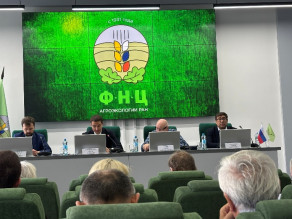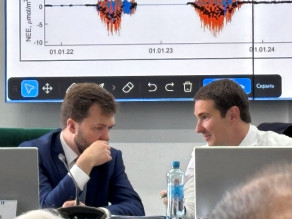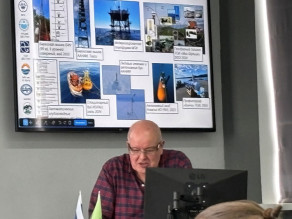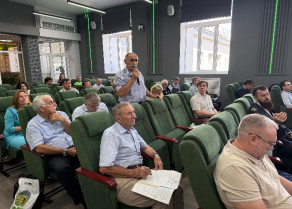 On August 11-12, a visiting meeting of the Council under the Ministry of Science and Higher Education of the Russian Federation on issues of ensuring the development of carbon balance control technologies was held. The meeting was held in the city of Volgograd at the Federal Scientific Center for Agroecology, Integrated Land Reclamation and Protective Afforestation of the Russian Academy of Sciences.
On August 11-12, a visiting meeting of the Council under the Ministry of Science and Higher Education of the Russian Federation on issues of ensuring the development of carbon balance control technologies was held. The meeting was held in the city of Volgograd at the Federal Scientific Center for Agroecology, Integrated Land Reclamation and Protective Afforestation of the Russian Academy of Sciences.
The work of the Council was attended by First Deputy Minister D.S. Sekirinsky, Director of the Department of State Policy in the Sphere of Scientific and Technological Development A.P. Shashkin and Head of the Expert Center Academician S.K. Gulev.
 The meeting heard reports from the heads of carbon polygons, which presented the main results of climate monitoring and research in terrestrial and marine ecosystems, as well as plans for the activities of the polygons for 2026-28.
The meeting heard reports from the heads of carbon polygons, which presented the main results of climate monitoring and research in terrestrial and marine ecosystems, as well as plans for the activities of the polygons for 2026-28.
Representatives of consortiums formed within the framework of the most important innovative project of national importance "Unified National System for Monitoring Climate-Active Substances" spoke at the meeting. In their speeches, they all emphasized the importance of research conducted at carbon polygons, the feasibility of interaction between the two projects in order to achieve the fundamental and applied tasks they solve. The results of work at carbon polygons are already being used to clarify the conversion factors used in calculations that underlie the preparation and maintenance of the National Greenhouse Gas Inventory.
The Council raised the issue of the need to develop metrological standards for monitoring greenhouse gas flows, which would ensure comparability of in-kind measurement data. It was decided to hold a separate special meeting on this issue.
 Another area of interaction was the proposal to consolidate efforts in the field of modeling greenhouse gas flows. Success in this matter will allow moving from integrated assessments of the carbon balance in ecosystems to assessments of the balance on the territory of administrative entities, which is very important from the point of view of the same National Greenhouse Gas Cadastre.
Another area of interaction was the proposal to consolidate efforts in the field of modeling greenhouse gas flows. Success in this matter will allow moving from integrated assessments of the carbon balance in ecosystems to assessments of the balance on the territory of administrative entities, which is very important from the point of view of the same National Greenhouse Gas Cadastre.
The Council considered proposals to create carbon polygons in the Republic of Dagestan (operator – Dagestan State University) and in the Rostov Region (operator – Obukhov Institute of Atmospheric Physics). The Council members expressed a number of critical comments that should be taken into account when developing programs for the creation and operation of the proposed carbon polygons.
In addition, programs for the creation of “mirror sites” in the Republic of Serbia (operator – Institute of Lowland Forests and Environment of the University of Nova Sad) and the Republic of Kazakhstan (operator – Berdyev Scientific and Production Center for Grain Farming) were presented to the Council.
 In his closing remarks, Deputy Chairman of the Council D.S. Sekirinsky expressed approval of the activities of carbon polygons in general and noted the need to take into account landscape priorities when forming new carbon polygons, the importance of identifying verifiers of developed climate projects and achieving international standards by carbon polygons.
In his closing remarks, Deputy Chairman of the Council D.S. Sekirinsky expressed approval of the activities of carbon polygons in general and noted the need to take into account landscape priorities when forming new carbon polygons, the importance of identifying verifiers of developed climate projects and achieving international standards by carbon polygons.
The Council meeting was held in a fruitful and constructive atmosphere, for which the organizers and the host party, the Federal Scientific Center for Agroecology of the Russian Academy of Sciences, deserve great credit.